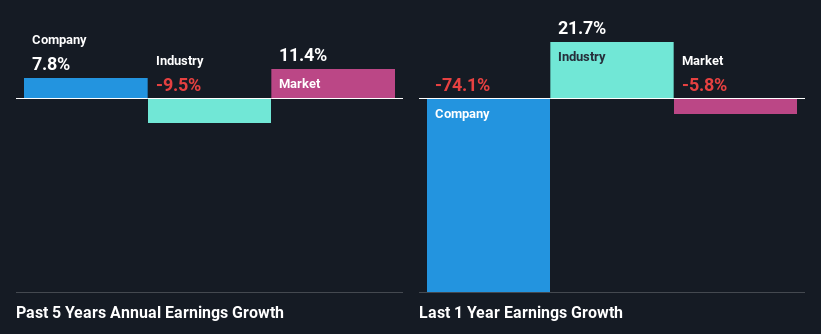Is Japan Foods Holding Ltd.'s (Catalist:5OI) Stock Price Struggling As A Result Of Its Mixed Financials?
Japan Foods Holding (Catalist:5OI) has had a rough three months with its share price down 23%. It seems that the market might have completely ignored the positive aspects of the company's fundamentals and decided to weigh-in more on the negative aspects. Fundamentals usually dictate market outcomes so it makes sense to study the company's financials. Particularly, we will be paying attention to Japan Foods Holding's ROE today.
Return on equity or ROE is a key measure used to assess how efficiently a company's management is utilizing the company's capital. In short, ROE shows the profit each dollar generates with respect to its shareholder investments.
See our latest analysis for Japan Foods Holding
How To Calculate Return On Equity?
Return on equity can be calculated by using the formula:
Return on Equity = Net Profit (from continuing operations) ÷ Shareholders' Equity
So, based on the above formula, the ROE for Japan Foods Holding is:
6.0% = S$1.9m ÷ S$31m (Based on the trailing twelve months to September 2023).
The 'return' refers to a company's earnings over the last year. So, this means that for every SGD1 of its shareholder's investments, the company generates a profit of SGD0.06.
What Is The Relationship Between ROE And Earnings Growth?
We have already established that ROE serves as an efficient profit-generating gauge for a company's future earnings. Depending on how much of these profits the company reinvests or "retains", and how effectively it does so, we are then able to assess a company’s earnings growth potential. Assuming everything else remains unchanged, the higher the ROE and profit retention, the higher the growth rate of a company compared to companies that don't necessarily bear these characteristics.
A Side By Side comparison of Japan Foods Holding's Earnings Growth And 6.0% ROE
At first glance, Japan Foods Holding's ROE doesn't look very promising. Yet, a closer study shows that the company's ROE is similar to the industry average of 6.5%. Even so, Japan Foods Holding has shown a fairly decent growth in its net income which grew at a rate of 7.8%. Taking into consideration that the ROE is not particularly high, we reckon that there could also be other factors at play which could be influencing the company's growth. Such as - high earnings retention or an efficient management in place.
When you consider the fact that the industry earnings have shrunk at a rate of 9.5% in the same 5-year period, the company's net income growth is pretty remarkable.

Earnings growth is a huge factor in stock valuation. What investors need to determine next is if the expected earnings growth, or the lack of it, is already built into the share price. This then helps them determine if the stock is placed for a bright or bleak future. Is Japan Foods Holding fairly valued compared to other companies? These 3 valuation measures might help you decide.
Is Japan Foods Holding Efficiently Re-investing Its Profits?
While Japan Foods Holding has a three-year median payout ratio of 100% (which means it retains 0.2% of profits), the company has still seen a fair bit of earnings growth in the past, meaning that its high payout ratio hasn't hampered its ability to grow.
Additionally, Japan Foods Holding has paid dividends over a period of at least ten years which means that the company is pretty serious about sharing its profits with shareholders. Our latest analyst data shows that the future payout ratio of the company is expected to drop to 67% over the next three years. As a result, the expected drop in Japan Foods Holding's payout ratio explains the anticipated rise in the company's future ROE to 9.1%, over the same period.
Conclusion
On the whole, we feel that the performance shown by Japan Foods Holding can be open to many interpretations. Although the company has shown a pretty impressive growth in earnings, yet the low ROE and the low rate of reinvestment makes us skeptical about the continuity of that growth, especially when or if the business comes to face any threats. That being so, the latest analyst forecasts show that the company will continue to see an expansion in its earnings. Are these analysts expectations based on the broad expectations for the industry, or on the company's fundamentals? Click here to be taken to our analyst's forecasts page for the company.
Have feedback on this article? Concerned about the content? Get in touch with us directly. Alternatively, email editorial-team (at) simplywallst.com.
This article by Simply Wall St is general in nature. We provide commentary based on historical data and analyst forecasts only using an unbiased methodology and our articles are not intended to be financial advice. It does not constitute a recommendation to buy or sell any stock, and does not take account of your objectives, or your financial situation. We aim to bring you long-term focused analysis driven by fundamental data. Note that our analysis may not factor in the latest price-sensitive company announcements or qualitative material. Simply Wall St has no position in any stocks mentioned.

 Yahoo Finance
Yahoo Finance 